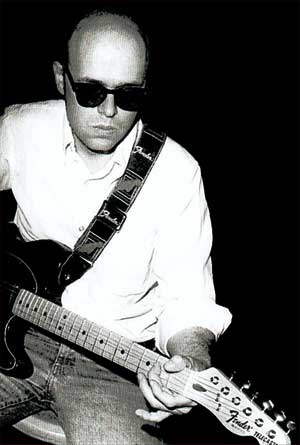Robert Quine will answer your questions.
Submit your questions to "ask quine" and check back here for updates.
Q: Robert: Really excellent guitar work on that R.I.P. Hell album that just came out. I haven't found a place yet to get any tabs. I am beholden to you if you could send me the tabs or chords that you used in creating that magnificent intro to 'Blank Generation'. Thanks and best of luck, Robert Houston.
A: Robert Quine did not create the chord intro to 'Blank Generation'; that was Ivan Julian. Quine did the lead guitar work throughout.
A Note From Robert Quine:
I'd like to thank the nice people who've written to this website. Most or all of the comments/questions have been forwarded to me. There have been a lot of them—more than I can possibly answer, and for this I apologize. I've recently gotten around to answering some of them, although it's taken me a long time to get to it. Many of the questions have already been answered in readily accessible interviews I've done over the years, but I apologize for any unanswered questions I let slip by. (By the way, there's an upcoming interview in Vintage Guitar [May 2002].)
As for current musical activities, recording session work has slowed down considerably, to say the least. There's not much to report. But I almost always get in at least three to four hours a day practicing, and I think I'm still improving. I guess the most gratifying thing that happened for me in 2001 was the release of The Velvet Underground "Quine Tapes" after 32 years. I'm glad that most people seem to be able to tolerate these "low-fi" recordings and concentrate on the music.
I'd especially like to thank Steve Caratzas. I only met him once, and he generously took it upon himself, unasked, to set up this site. He's totally responsible for it, aside from a few bits of information I supplied. I really appreciate the amount of work he's put into it. I'd also like to thank Michael Carlucci (Subterranean Records in NYC) and Philip Obbard for their initial (though unsuccessful) efforts to convince me to set up my own website. And I'd like to thank Michael for keeping the lines of communication open between me and Steve. (I know NOTHING about computers and don't have my own personal e-mail address.) Happy New Year. —RQ
Q: Robert: I was pretty taken aback that someone else besides myself has discovered Prescription Electronics, and even more taken aback that you are a Yardbirds/Jeff Beck fan, good stuff man! Maybe you can help me on this one—I have been trying to figure out those really fast runs that Jeff does on 'Jeff's Boogie' (the ones where he imitates Les Paul). To this day I can't figure out if he is doing hammer-on's or picking the actual notes. Any solutions? Take care. —Marc : )
A: Marc: What Beck is doing is exactly what Les Paul does, pull off's from the 6th and 3rd frets on the 1st, and 2nd strings 5th & 3rd frets on the 3rd and 4th strings and then doing them on top of one another on overdubs. Thanks. —Robert Quine
Q: Years ago I had read somewhere that you were influenced by Jorma Kaukonen. What are your thoughts on Jorma's playing? —Mike
A: No, he's had absolutely no influence on my playing. I really haven't "followed" him, so I can't really add anything. Sorry.... —Robert Quine
Q: Just wanted to tell you it was always a pleasure to listen to you play the guitar. I was wondering if you ever gave serious thought to making a Blues CD? Also, it was nice to see Roy Buchanan was one of your influences. I was wondering if you had the chance to read the book that came out about him? —Perry
A: Yeah, I got the Roy Buchanan book, and it's really well done—it's only unfortunate that his wife refused to contribute her insights. I've been thinking about doing another album in my studio—it would be the third one. The last two were duos, this would be just me playing guitars, bass and drum machine. There would be blues elements (there always have been), but I would mutate them. 'Despair', from the album Basic, is a good example of what I'm talking about. Thanks. —Robert Quine
Q: I really like your tone. I remember the first time I saw you with Lou Reed and you were playing 'I Love You, Suzanne' on a Strat! That's what I have to have. I appreciate your advice over the years concerning Peavey amps. Are you aware of Peavey Classics? They are pretty similar to the Deuces. When are you going to put out an album of all instrumental type guitar tunes? —Mike Caldwell
A: My friend Jody Harris turned me on to Peavey stuff in the late '70s. Incredibly inexpensive, they sounded great, and the solid-state stuff could take a LOT of abuse. Most importantly, using the master volume for good distortion was an actual possibility, compared to the Fenders at that time. The only amp I ever used on the three Lou Reed albums I was on was a Peavey Bandit, upgraded with an EV speaker. The Peavey Classics—they're great-sounding. I recorded with them a lot in the early '90s, especially the Classic 20. Since then, however, I've moved to the various Fender reissue amps—I love them. Obviously, there's no master volume or channel-switching, but this hasn't been a problem for me since I discovered Tube Screamers in the early '90s. —Robert Quine
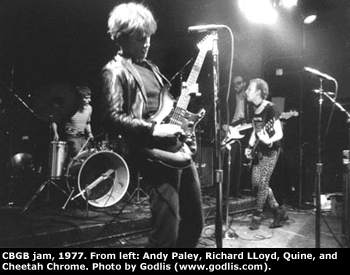
Q: Do you own or play any guitars that are handmade by small, individual guitar-builders? —Norman L. Beberman (GuitarNation.com)
A: Generally, no. The only exception is a guitar recently built for me by Rick Kelly of Carmine Street Guitars in NYC. It's based on an early '50s Telecaster and is a truly great-playing, great-sounding guitar. (He has access to a lot of OLD WOOD.) It's got Seymour Duncan Antiquities pickups—the early '50s type. —Robert Quine
Q: Here's a real gear-geek question. I read recently that your current rig is a Fender Telecaster through a Deluxe Reverb reissue. I've tried this combination and found its high-end overwhelming. Do you roll off the highs or have you performed any modifications to the amp itself? —Kenneth Coleman
A: Well, Telecasters are pretty trebly, aren't they? I highly recommend the Jerry Donahue Bridge pickup. It's a little fatter and warmer that most Telecaster pickups but doesn't compromise that vintage Tele "twang." Also, using three brass bridge saddles helps warm up the sound and also gives you more sustain than the six-saddle bridges. If you're really, really concerned about "perfect" intonation, get a set of the three "angled" brass saddles (as popularized by Danny Gatton). They're relatively easy to find now. They're distributed by Stewart/MacDonald's Guitar Shop Supply (Athens, Ohio), and Carmine Street Guitars (NYC) keeps them in stock.
As for the Deluxe Reverb reissue, I almost always use the left channel ("normal")—it's less trebly than the vibrato channel. When I roll off highs, I do it with the amp's tone controls—NEVER with the guitar's tone control. Also, I replaced the 12-inch ceramic magnet speaker with an alnico one—the Eminence Legend 1228K model with a Kapton voice coil. It's rated at 35 watts and is much less harsh-sounding when pushed into overdrive/distortion. By the way, my friend Marc Ribot also used this setup and he's been quite happy with it.
A lot of people are going for the new Jensen alnicos right now, but I slightly prefer the Eminence ones—they sound less harsh and trebly to me. However, reliable friends have told me that the Jensens break in (and warm up) in a matter of weeks—not years, so.... Well, I've gone on too long! Hope my (very subjective) opinions have helped. —Robert Quine

Q: I read that sometimes Richard Hell would cancel or even no-show when you were recording, and that you would just lay down more and more guitar tracks. If this is true, did you help mix these and decide which tracks were used in the final cut? —Sav
A: When we were working on Destiny Street in early '81, Richard did totally disappear for a week (that's the only time that ever happened). We had already done the basic tracks. But the time was already booked, so Naux and I went in and did a LOT of overdubs during that week (too many!).
Then Richard reappeared and did his vocals and fixed a few bass parts. Then over a year went by before the album was mixed. I was invited to participate but declined—I was busy, and couldn't face dealing with the nightmarish number of overdubs I'd done (backwards guitars, constant feedback, etc.). So I wrote down some of my opinions on how the record could be mixed, some of which were followed.
My one basic misgiving about the final mix is that many of the guitars on the "live" basic tracks were fairly inaudible, buried under overdubs that were only meant for adding subtle textures. But over the years I got used to that mix, and it's difficult for me to imagine the album sounding any other way, for better or worse. Thanks. —Robert Quine
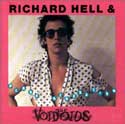
Q: Robert Quine's solos on 'Blank Generation' have remained with me since I first heard them at age 16 in 1982. I've recently discovered Thelonious Monk and found that these two musical giants share the ability to take a simple melody to the edge of falling apart; have it clang down into a pile of jangly mis-notes and bring it all back together just as the listener is about to decide it has become chaos.
So my question for Robert Quine is: Do you listen to Thelonious Monk? Do you see any similarities in your styles? And how do you teach yourself to play such brilliant guitar? —Chris Good
A: Thank you for your nice comments. My favorite solos of mine are the ones where I take outrageous chances, and sometimes land on my feet. (One recent example is 'Pale Blue Eyes' on a CD by Reiss—Vibe of Life—but I have to warn you that I only play on a few tracks.) There are a lot of influences for this approach—Jeff Beck with the Yardbirds is the most important. And there are a lot of jazz influences. I can't play jazz, but I've listened enough for it to have affected my approach. Yeah, Thelonious Monk is one of those influences. My favorite stuff of his is on the 3-CD set The Complete Prestige Recordings. The two takes of 'The Man I Love'—talk about taking chances! —Robert Quine
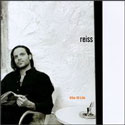
Q: Mr. Quine, was Grady Martin an influence on you? If so, via which artist? Maybe with the Johnny Burnette Trio? —your ever faithful fan, Mary
A: I loved the Johnny Burnette Trio stuff when I was a kid, and in the '70s I'd hear a lot of '50s Decca rockabillies credited to Grady Martin on guitar. It sounded a lot like many of the solos on the Burnette trio records, so I began to wonder if Paul Burlison actually took all the solos on the trio stuff. I guessed probably not. You probably know more about this than I do. But generally Grady Martin didn't influence me much. The biggest influences then were Ritchie Valens, Link Wray, and James Burton. Thanks. —Robert Quine
Q: Hello Robert: I've always been fascinated by your playing. Your solos sound so fresh and original, yet still retain a great sense of composition and structure. My question is ... are your solos usually improvised, or do you compose your solos in advance? —Bruce Emery
A: 98% improvised. Once in a while with Richard Hell, I'd hear a cassette of a good solo I'd improvised live (e.g.: 'The Plan') and copy it. But it's never as good as the first time around. Thanks. —Robert Quine
Q: I am a guitar player. My introduction to your playing is Matthew Sweet's Girlfriend. Your playing on that record is absolutely phenomenal and unique. Your tone is also fantastic on that record. Would you mind sharing your setup on the song, 'I've Been Waiting'? Did you use the same fuzz pedal for the entire album? I can't get enough of that song and I listen to that record all the time. Thanks very much. —Gary Rosner
A: I didn't play on 'I've Been Waiting'. But on that album all I used was a Strat, a SansAmp, and various Fender amps. Thanks. —Robert Quine
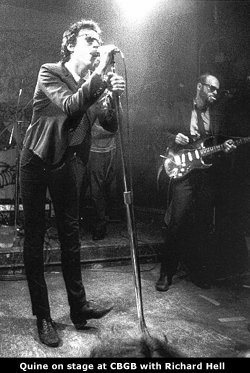
Q: Does Robert ever give guitar lessons anymore? I know I read he doesn't feel he's a good teacher, etc., but would he be willing to give lessons? —David Klein, MD
A: I gave one guitar lesson in my life and basically showed that person all of my tricks. I'm not a teacher, it's just not in me to be one. I'm flattered that I am asked but just not comfortable with the idea of doing it. —Robert Quine
Q: Kooghan of the U.K. asks: Do you have any idea if Basic [recorded with Fred Maher in 1984] is in print on CD?
A: The CD version of Basic is currently out of print.
Q: Antoine from France writes: May we expect a full-length CD of brand new songs by the original Voidoids in the near future?
A: Not likely. Just the newly recorded 'Oh' which you can find on the Internet [note: the song is no longer available as a free Internet download, but can now be found on the CD Beyond Cyberpunk]. This was a one-off/one-shot deal. Who knows what the future might bring, but for the moment, no plans to record or play out. —Robert Quine
Q: Are there any plans to issue Escape [recorded with Jody Harris in 1981] on CD?
A: Not that I know of. —Robert Quine
Q: Are you recording with Judah Bauer from Jon Spencer Blues Explosion? If so, when can we expect to see/hear anything?
A: Robert Quine did record with Judah a few months back. He played bass, however, not guitar. Whether or not those recordings come out is another thing. Quine is still waiting to hear from Judah to see if the sessions he played on will be released. Thanks for the inquiry.
Submit your questions to "ask quine" and check back here for updates.
![]()

